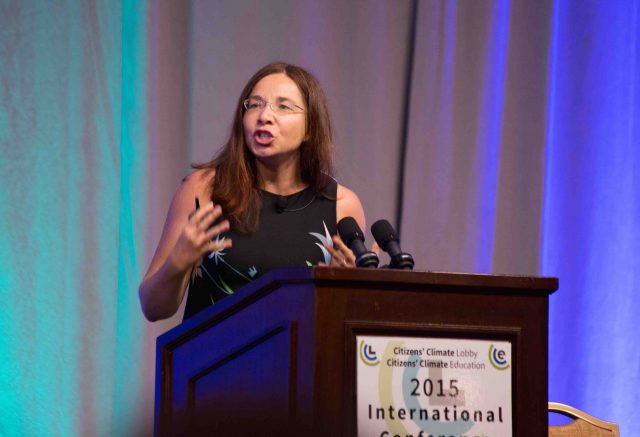
Christian Makes Case For Climate Change At UN Summit
Katharine Hayhoe, a climate scientist and evangelical Christian, says she gets slammed every day on social media for her contributions to establishing that climate change is human-made.
But on Monday, she was welcomed with applause at a United Nations-backed climate summit in the capital of Canada’s western province of Alberta, where polls show that climate skepticism rates are among the highest in the country.
Hayhoe, a professor at Texas Tech University, has emerged in recent years as a leading voice sharing the science of climate change to skeptics – many of whom are fellow evangelical churchgoers.
A 2015 survey from the Washington D.C.-based Pew Research Center found that just one quarter of white evangelicals in the United States believe that climate change is caused by humans.
A separate Pew poll from 2016 showed that white evangelicals voted overwhelmingly to elect United States President Donald Trump, who has pulled his country out of the Paris agreement, a global pact to curb climate change.
But Hayhoe said it is that same Christianity that fuels her dedication to climate science.
“I study climate change because I think it’s the greatest humanitarian crisis of our times,” she said.
“It exacerbates poverty and hunger and disease and civil conflicts and refugee crises,” she told the Thomson Reuters Foundation.
Traits that have made Hayhoe uniquely qualified to speak authoritatively in such conservative circles are best summed up by two accolades she has received.
For her work in explaining climate change, Hayhoe has made TIME magazine’s list of most influential people, and she was named one of the 50 Women to Watch by the evangelical magazine Christianity Today.
Her calling came “completely serendipitously.”
Six months into her marriage, her husband, a linguistics professor, told her about his disbelief in global warming.
“You have somebody you respect and you also love, and you also want to stay married. I said well, ‘Let’s talk about it.'”
It took two years of discussion to agree that heat-trapping greenhouse gas emissions attributable to human activity are driving today’s climate change.
The marital episode and her subsequent engagement with faith groups have firmed up her views that the traditional conservative tenet of small government – not science – usually explains why some resist the issue.
“(It’s) not because they really have a problem with the science,” she said. “It’s because they have a problem with the perceived solutions.”
“Taxes, government legislation, loss of personal liberty … that’s the real problem people have.”
Hayhoe did not field any questions from climate change skeptics during her talk at the summit in Edmonton. And her message struck particularly close to home in a province that is Canada’s main oil producer.
“The world energy system is undergoing an energy revolution … from old dirty energies that we have been using for hundreds of years to clean, endless sources of energy like wind,” she said, in an interview after her speech.
“Oil and gas companies, they look down the road and they understand that the world is changing.”
Under the Paris agreement, nearly 200 countries agreed to curb planet-warming emissions enough to keep the rise in global temperatures to well below 2 degrees Celsius (3.6 Fahrenheit) above pre-industrial times, ideally to 1.5 degrees.
But without unprecedented action temperatures could rise above 1.5 degrees, according to a draft report by the U.N.’s Intergovernmental Panel on Climate Change seen by Reuters earlier this year.
Follow us on Twitter











